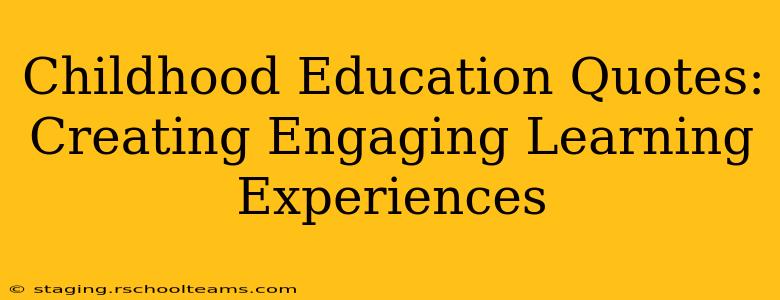Childhood is a time of incredible growth and development, a period where the seeds of future success are sown. The words of wisdom from educators, philosophers, and thinkers throughout history offer invaluable insights into nurturing young minds and fostering a love of learning. This article explores powerful childhood education quotes, examining their implications and relevance in creating engaging and enriching learning experiences for children. We'll also delve into frequently asked questions surrounding effective early childhood education.
The Importance of Play in Early Childhood Development
Maria Montessori famously stated, "Play is the work of the child." This simple yet profound quote highlights the crucial role of play in a child's development. Play isn't just idle amusement; it's a vital tool for learning, problem-solving, social interaction, and emotional regulation. Effective early childhood education programs recognize this and incorporate ample opportunities for free play, guided play, and play-based learning activities. Through play, children develop crucial skills like creativity, critical thinking, and collaboration, laying a strong foundation for future academic success.
The Power of Positive Reinforcement
"The best way to encourage good behavior is to praise it." While the exact origin of this quote is uncertain, its message resonates deeply within the field of childhood education. Positive reinforcement focuses on acknowledging and rewarding positive behaviors, fostering a sense of accomplishment and encouraging repetition. Rather than dwelling on mistakes, educators can empower children by highlighting their strengths and progress. This approach creates a supportive and encouraging learning environment, boosting self-esteem and motivating children to learn and grow.
The Role of the Educator as a Facilitator
"The teacher who is indeed wise does not bid you to enter the house of his wisdom but rather leads you to the threshold of your mind." This quote, attributed to Khalil Gibran, emphasizes the role of the educator as a facilitator rather than a dispenser of knowledge. The best educators guide children to discover their own potential, fostering a love of learning and encouraging independent thinking. This involves creating a stimulating environment, asking thought-provoking questions, and providing opportunities for exploration and discovery. The focus shifts from rote memorization to a deeper understanding and application of knowledge.
Nurturing Curiosity and a Love of Learning
"What lies behind you and what lies in front of you, pales in comparison to what lies inside of you." Ralph Waldo Emerson's words remind us of the boundless potential within each child. Effective childhood education nurtures a child's natural curiosity, fostering a lifelong love of learning. This involves creating a learning environment that is stimulating, engaging, and relevant to children's lives. It's about fostering a sense of wonder and encouraging children to ask questions, explore, and experiment.
Frequently Asked Questions (FAQ) about Childhood Education
What are the key characteristics of a high-quality early childhood education program?
High-quality early childhood education programs prioritize play-based learning, provide a nurturing and supportive environment, have qualified and experienced educators, offer a developmentally appropriate curriculum, and involve parents in their children's education. They focus on the whole child – cognitive, social, emotional, and physical development.
How can parents support their child's learning at home?
Parents can support their child's learning by engaging in activities that encourage reading, storytelling, singing, and playing together. Providing a stimulating environment filled with books, toys, and opportunities for exploration and discovery also plays a crucial role. Open communication with educators about their child's progress is also essential.
What is the impact of early childhood education on a child's future success?
Research consistently shows that high-quality early childhood education has a significant positive impact on children's future academic, social, and emotional success. It improves school readiness, enhances cognitive development, and reduces the risk of later educational difficulties. Furthermore, early childhood education can positively influence long-term social and economic outcomes.
How can educators create engaging learning experiences for diverse learners?
Creating engaging learning experiences for diverse learners involves understanding and addressing individual learning styles, needs, and cultural backgrounds. Differentiating instruction, using various teaching methods, and providing ample opportunities for choice and collaboration are key strategies for inclusive education.
Conclusion
The quotes highlighted in this article, along with the answers to frequently asked questions, emphasize the importance of creating engaging and enriching learning experiences for children. By understanding the power of play, the importance of positive reinforcement, and the role of the educator as a facilitator, we can nurture young minds and foster a lifelong love of learning. Remember, investing in early childhood education is an investment in a brighter future for all.
